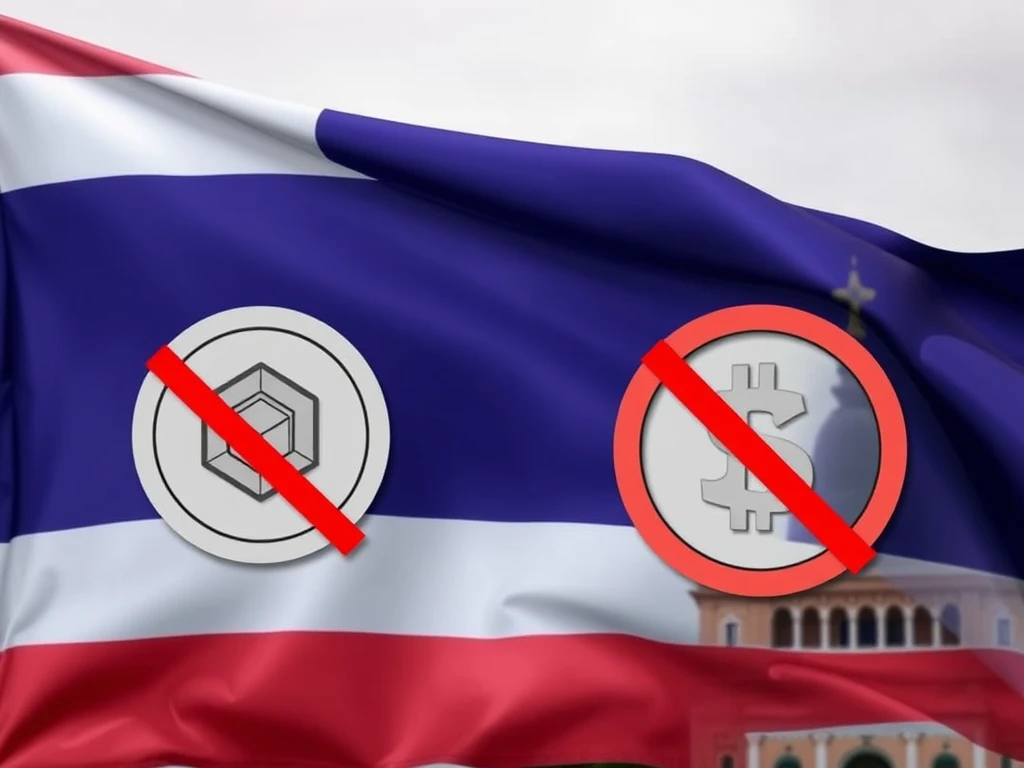Urgent Thailand Crypto Ban: Bybit, OKX Among 5 Exchanges Facing Blockade

A significant development is shaking up the crypto landscape in Southeast Asia. Thailand’s financial regulators have issued a directive that will impact several major international cryptocurrency exchanges operating within the country. If you use platforms like Bybit or OKX, this news requires your immediate attention.
Understanding the Thailand Crypto Ban
The core of the issue lies in operating without the necessary licenses. The Thailand Securities and Exchange Commission (Thailand SEC) has taken a firm stance against platforms it deems non-compliant with local regulations. This regulation is part of a broader effort by the Thai government to establish clear rules for the digital asset space and enhance investor protection. The recent order signals a strong commitment to enforcing these rules, leading to a significant crypto exchange block for specific platforms.
Which Platforms Are Affected by the Crypto Exchange Block?
The directive specifically targets five international cryptocurrency exchanges. These are:
- Bybit
- 1000X
- CoinEx
- OKX
- XT.COM
According to the May 29 announcement from the Thailand SEC, these platforms are scheduled to be blocked nationwide starting June 28. The regulatory body explicitly cited unlicensed operation within Thailand as the primary reason for this action, alongside concerns related to potential money laundering activities. This impacts users of platforms like Bybit Thailand and OKX Thailand directly.
Why is Thailand SEC Crypto Regulation Getting Stricter?
The decision is rooted in recent legislative changes in Thailand. The Royal Decree on Measures for the Prevention and Suppression of Technology Crimes, effective since April 13, empowers the Ministry of Digital Economy and Society (MDES) to block unauthorized digital asset trading platforms. Furthermore, amendments to emergency decrees on digital asset businesses and cybercrime prevention were approved in early April. These new rules aim to deter and prevent foreign crypto P2P service providers, which are classified as digital asset exchanges under Thailand’s Digital Asset Business Law, from operating without local authorization. The Thailand SEC crypto crackdown is a direct consequence of these reinforced legal frameworks.
Risks of Using Unlicensed Platforms in Thailand
The Thailand SEC has issued a clear warning to the public regarding the use of unlicensed cryptocurrency services. The main takeaway is that users of platforms subject to the crypto exchange block would not receive protection under Thai law. This exposes individuals to various risks, including potential scams and involvement in money laundering schemes. The SEC strongly advises all investors using these platforms to take necessary action regarding their assets before the June 28 shutdown date to avoid potential loss or inability to access funds. This underscores the importance of understanding the Thailand SEC crypto regulations.
Navigating the Thailand Crypto Ban: What Users Need to Do
For users of Bybit, OKX, 1000X, CoinEx, and XT.COM in Thailand, the most critical step is to secure your assets before the June 28 deadline. This could involve withdrawing funds, transferring assets to a licensed platform in Thailand, or exploring other compliant options. Ignoring the Thailand crypto ban could result in frozen assets or inability to trade. While platforms like Bybit Thailand and OKX Thailand had not publicly responded to inquiries at the time of the original report, users should seek official communications from these exchanges regarding the situation and potential solutions.
Thailand’s Evolving Approach to Crypto
It’s important to view this crypto exchange block in the broader context of Thailand’s evolving stance on digital assets. While cracking down on unlicensed operations, the country is also exploring ways to integrate crypto into its economy. Recent reports indicate preparations to allow tourists to spend cryptocurrency via credit card-linked platforms. The Ministry of Finance is reportedly planning to issue digital investment tokens worth $150 million. Additionally, local regulators have approved stablecoins like USDt and USDC for listing on regulated exchanges. This suggests a measured approach: embracing digital assets under strict regulatory oversight, rather than a complete prohibition. The Thailand SEC crypto actions are part of this dual strategy.
Summary: Act Before the Deadline
The Thailand crypto ban affecting Bybit, OKX, and three other exchanges is a significant regulatory event driven by unlicensed operations and money laundering concerns. With the crypto exchange block set for June 28, users in Thailand must act urgently to manage their assets on these platforms. This action by the Thailand SEC crypto division highlights the increasing global trend of stricter digital asset regulation. While Thailand explores broader crypto adoption, compliance remains a top priority for regulators. Ensure you are using platforms licensed to operate legally in Thailand to protect your investments.









